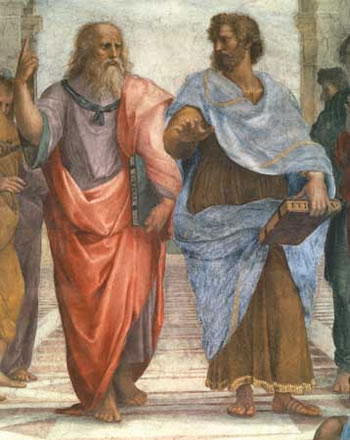Platonism and Aristotelianism

In the first millennium of Christianity thinking, Platonism was the predominant philosophical stream that nourished its spiritual practice and theology. In the West the Cathedral of Chartres was the centre for Platonic thinking under the Cistercians, a role it played up until around the year 1200. At that time, the Aristotelian schools began to develop in Paris under the leadership of the Dominicans; that outlook then came to dominate Western thought.
For the Platonist, the sensible world is the reflection of the intelligible world, man’s true home. The manifest world should lead us to the realm of ideas. That is why Plato is pointing upwards in Raphael’s The School of Athens. Aristotle, Plato’s pupil, emphasizes knowledge of the sensible world, hence is portrayed pointing down.
Rudolph Steiner makes this comment about these two streams of thought.
Aristotle’s view of the world is not really in conflict with that of Plato. The difference lies more in the way in which the interests of the two men are concentrated on different sides of reality (the world of ideas and that of the senses). For Plato the sense-world is merely a preliminary stage for reaching the world of ideas; the former has meaning only in so far as it helps us to reach the latter. The opposite is the case with Aristotle. He wants to explain the sense-world, and seeks the explanation in the ideas. We can say that substantially the two philosophers are of the same view, only their interest is centred on the two opposing sides.
Yet, in spite of this deep spirituality affinity between the two philosophers, their respective interests affect their attitude toward the world. For their followers, this difference is reflected in their activity in the world. Goethe explains the differences between the two ways of thinking.
Plato stand in relation to the world as a spirit pleased to dwell here for a while. He is not so much concerned with learning about it — for the has always accepted its existence — as he is with imparting to it in a friendly way what is so sorely needs. So he penetrates to the depths more to fill them with his being than to investigate them. Is it to the heights that he ascends with longing to participate again in his origin. All that he says refers to an eternal Unity — Good, True, Beautiful — and he strives to kindle every human heart with love for it, while the details of earthly knowledge melt, we could even say vaporize, in his method, in his delivery.
Aristotle, on the other hand, stands in relation to the world like man as master-builder. After all, he is here, and is to work and create. He investigates the soil, but only until he finds the ground he needs. From there to the centre of the earth, all else is a matter of indifference to him. Once in his place, he draws an enormous circle for the foundation of his building, collects materials from all directions, organises them, piles them in orderly fashion atop one another, and in this way ascends to the heights, much like a pyramid; Plato ascends like an obelisk; indeed, like an aspiring flame.
As it is the task of the Hermeticist to reconcile opposites, we join with Goethe when he concludes:
Indeed, just as do various people, so also do the centuries divide themselves in their veneration of Plato and Aristotle, now peacefully, now in vigorous conflict. It can be seen as a great advantage for our century that they are equally esteemed, just as in his time Raphael, in the so-called School of Athens, was mindful of both and placed them beside one another.
NOTE: Acknowledgment to “The Golden Age of Chartres” by Rene Querido for source material.
Much of my thinking life has consisted of a waffling between these two. Thank you for reminding me of that.
I look forward to the day when you turn your sights to the Hebrew/Aramaic Yeshua. We see Him, through Greek filters, through a glass darkly…and we have much lost track of the means to work our way back to What Happened. I very much admire the thrust of your Search, its strength and staying on the track.